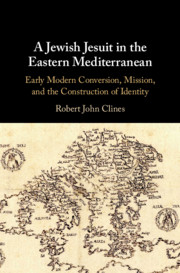 A Jewish Jesuit in the Eastern Mediterranean
A Jewish Jesuit in the Eastern Mediterranean Published online by Cambridge University Press: 27 September 2019
This chapter begins with the Coptic synod and its subsequent unraveling. First, while many Coptic theologians approved it, the patriarch refused to recognize the accord. Secondly, the synod was rejected in Rome because it was seen as heretical. Moreover, when the mission’s patron, Henry III, changed consuls, the new consul Cristoforo Vento and Eliano came to blows. In turn, Vento told the Ottoman officials that a Portuguese Jew named David Moze had evidence that Eliano aimed to overthrow Ottoman authority in Egypt. Eliano was arrested and nearly executed. Upon his release, Eliano went to great lengths to prove that his arrest was not the machinations of a Jew who wanted to punish him for his apostasy. While Eliano was eventually able to return to his work with the Copts one he successfully proved that Vento and not Moze was the culprit of the conspiracy against him, the mission’s breakdown and the confrontation with the Jews that led to his arrest are reminders that Eliano’s Jewish past, however helpful it might have been in allowing him to scour religious texts and engage in theological debates, was always potential fodder for accusations of renegadism and opportunism.
To save this book to your Kindle, first ensure [email protected] is added to your Approved Personal Document E-mail List under your Personal Document Settings on the Manage Your Content and Devices page of your Amazon account. Then enter the ‘name’ part of your Kindle email address below. Find out more about saving to your Kindle.
Note you can select to save to either the @free.kindle.com or @kindle.com variations. ‘@free.kindle.com’ emails are free but can only be saved to your device when it is connected to wi-fi. ‘@kindle.com’ emails can be delivered even when you are not connected to wi-fi, but note that service fees apply.
Find out more about the Kindle Personal Document Service.
To save content items to your account, please confirm that you agree to abide by our usage policies. If this is the first time you use this feature, you will be asked to authorise Cambridge Core to connect with your account. Find out more about saving content to Dropbox.
To save content items to your account, please confirm that you agree to abide by our usage policies. If this is the first time you use this feature, you will be asked to authorise Cambridge Core to connect with your account. Find out more about saving content to Google Drive.